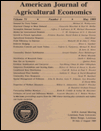Subjective Probabilities and Scoring Rules: Experimental Evidence
Abstract
This paper provides an articulation of the theory of scoring rules that leads to a testable hypothesis about strategic behavior under an improper rule. Subjects in a laboratory setting were first screened for linear utility in the range of rewards. Those that passed this test were used as subjects in a probability forecasting experiment. Results suggest that theory holds when subjects forecast over many periods, although inexperienced subjects may fail to exploit the dominant strategy in the initial periods.




